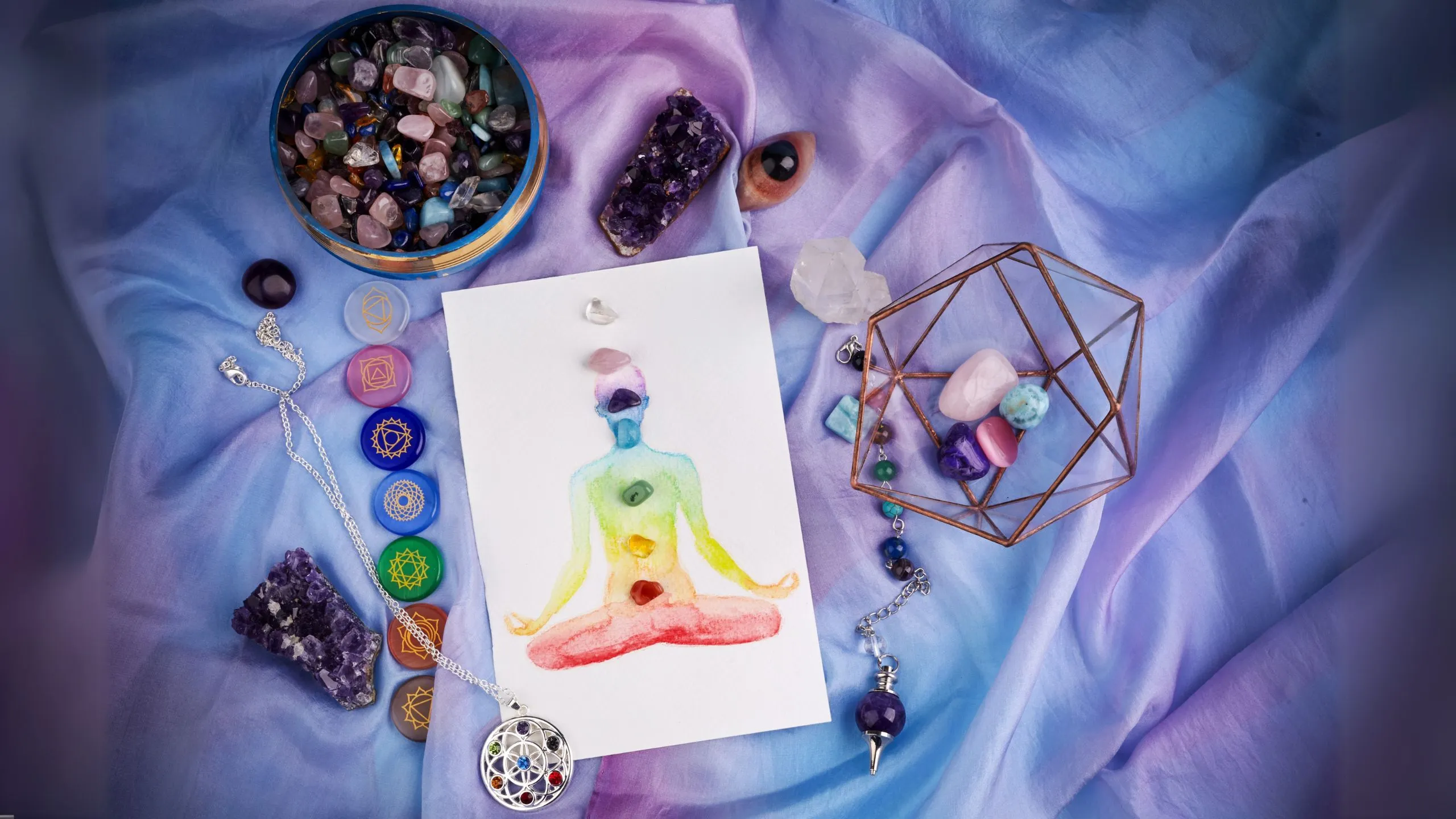“Colors are the silent language of the soul; they speak even when we cannot.”
Introduction: Why Colors Matter More Than We Realize
Did you know that colors can influence our decisions, moods, and even our spiritual well-being? According to a study published by the University of Winnipeg, color influences up to 90% of first impressions. But beyond visual appeal, color carries symbolic weight—especially in spiritual and metaphysical contexts.
In this article, we explore the spiritual significance of colors—a topic that stretches across cultures, ancient traditions, and modern psychological understanding. We’ll break down nine vibrant truths that reveal how each color interacts with our energy, emotions, and inner world.
Whether you’re drawn to vibrant reds or tranquil blues, there’s a deeper message waiting to be decoded.
Read More: 12 Beneficial Mindful Coloring Habits to Break Anxiety Cycles
What Is the Spiritual Significance of Colors?
Color isn’t just a visual experience—it’s energetic. The spiritual significance of colors refers to the metaphysical, emotional, and psychological meanings attached to specific hues.
From chakra alignment to aura readings, color symbolism has been used for centuries in spiritual practices, energy healing, and personal development. By tapping into the meaning of colors, we gain insight into our current state and what we need to bring ourselves into balance.
“Color is a power which directly influences the soul.” – Wassily Kandinsky
Let’s dive into the nine truths behind each powerful color.
Read More: Unveil the Spiritual Significance of Yoga Postures: Be an Expert in 30 Minutes Daily
Spiritual Significance of Common Colors
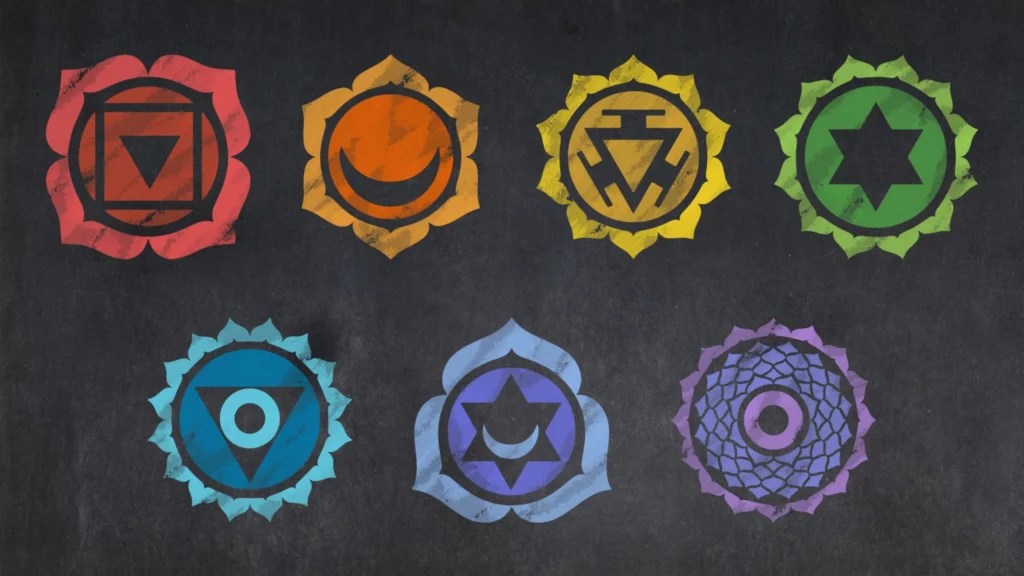
| Color | Chakra Association | Core Spiritual Meaning | Energy Type |
|---|---|---|---|
| Red | Root | Grounding, survival, passion | Stimulating |
| Orange | Sacral | Creativity, sensuality, joy | Energizing |
| Yellow | Solar Plexus | Confidence, clarity, strength | Uplifting |
| Green | Heart | Healing, balance, love | Harmonizing |
| Blue | Throat | Communication, calm, truth | Soothing |
| Indigo | Third Eye | Intuition, insight, wisdom | Deepening |
| Violet | Crown | Connection, transcendence | Enlightening |
| White | Aura/Crown | Purity, light, clarity | Cleansing |
| Black | Root/Shadow Work | Protection, mystery, depth | Grounding |
Read More: 8 Ancient Meditation Mudras That Erase Negativity & Elevate Focus
1. Red: The Root of Our Vitality
Red is the foundation—the color of the Root Chakra. It grounds us in the physical world, stimulates our primal instincts, and fuels survival energy.
In the spiritual significance of colors, red represents both life force and boundaries. Too much red? We might feel aggressive. Too little? Disconnected or fearful.
Key takeaway: Red keeps us rooted and energized, but balance is essential.
Associated aura color: Deep red signifies strong physical energy or intense emotion.
Use red when: You need courage, stamina, or grounding.
Read More: Pessimism vs Optimism – 5 Interesting Hidden Facts You Can’t Ignore
2. Orange: The Creative Flow
Orange connects to the Sacral Chakra, governing emotions, pleasure, and creativity. Spiritually, it embodies movement, joy, and the sacred dance of life.
This color inspires social connection and emotional fluidity. In the context of aura colors, orange often shows up in those with creative or expressive personalities.
Use orange when: You want to invite warmth, sensuality, or artistic expression.
Key takeaway: Orange unblocks emotional energy and invites joyful expansion.
Read More: What Are The Urgent Need for Personality Assessment – 6 Facts
3. Yellow: The Radiance of Clarity
Associated with the Solar Plexus Chakra, yellow symbolizes confidence, willpower, and self-identity. It’s a luminous color that activates mental clarity.
The spiritual color meanings of yellow often reflect optimism, but overexposure may stir anxiety or hyperactivity.
Use yellow when: You need to boost self-belief or sharpen focus.
Fun fact: In color therapy, yellow is believed to stimulate the nervous system and boost serotonin levels.
Key takeaway: Yellow empowers us to shine from within and make aligned choices.
Read More: How to Build Confidence? 5 Key Secrets to Eliminate Insecurities
4. Green: The Heart’s Harmony
Green connects with the Heart Chakra, symbolizing healing, love, and balance. In the spiritual significance of colors, green is deeply regenerative.
It appears in aura readings when someone is nurturing or going through healing. It also symbolizes abundance and spiritual growth.
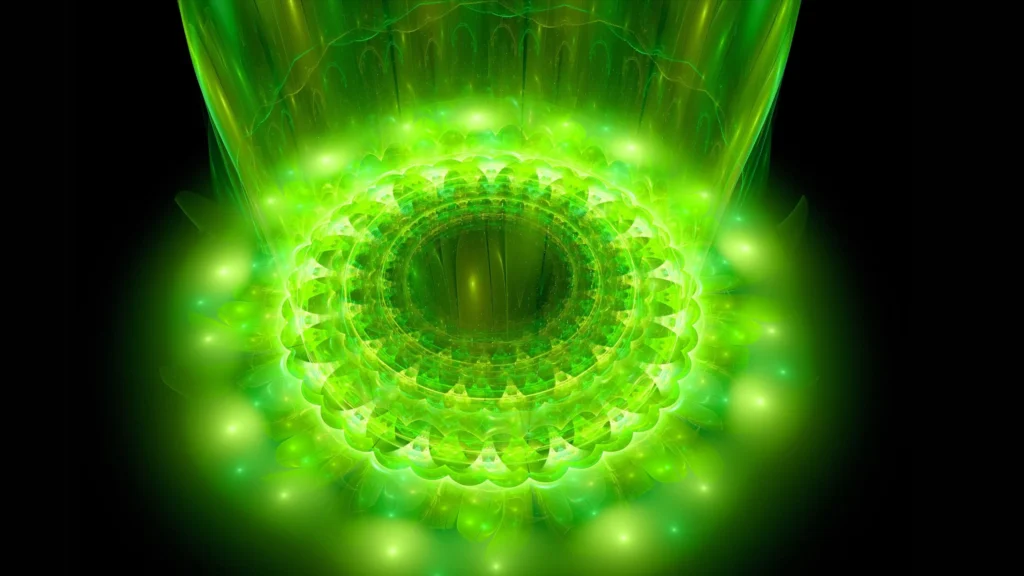
Use green when: You want to attract compassion, forgiveness, or inner peace.
Key takeaway: Green restores emotional equilibrium and invites openness.
Read More: How to Meditate on God’s Word: A 15-Minute Guide for Spiritual Growth
5. Blue: The Voice of Truth
Blue, tied to the Throat Chakra, represents clarity, communication, and trust. It’s a cool, calming color that promotes honest expression.
People with blue auras tend to be honest, wise, and intuitive communicators. Spiritually, it aligns with peace and divine connection.
Use blue when: You need to speak your truth or calm the mind.
Key takeaway: Blue supports clear, authentic self-expression and mental serenity.
Read More: Unlock the Secret Power of Humility and Kindness – 6 Smart Formulae Will Shock You!
6. Indigo: The Depth of Intuition
Linked with the Third Eye Chakra, indigo is a color of perception, psychic ability, and introspection.
In color symbolism, indigo represents truth beyond the material—seeing with the “inner eye.”
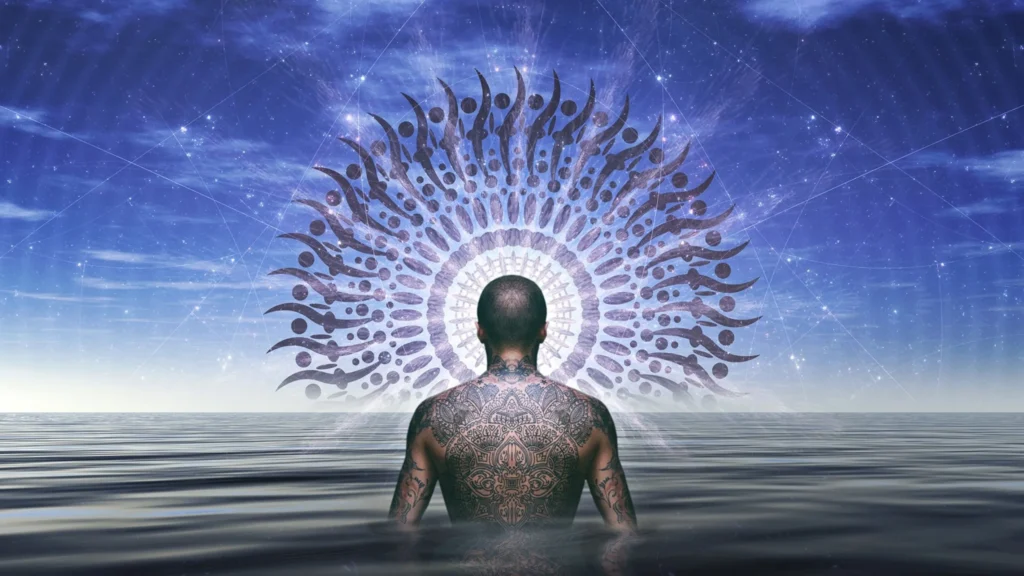
Use indigo when: You seek deeper understanding, dream insight, or spiritual awareness.
Key takeaway: Indigo deepens our spiritual vision and sharpens intuitive abilities.
Read More: Unlock the Power of Law of Attraction 432 Hz: Manifest Your Desires with Frequency
7. Violet: The Crown of Connection
Violet or purple connects us to the Crown Chakra, the gateway to divine wisdom and universal consciousness.
The spiritual significance of colors here includes transformation, enlightenment, and liberation from ego.
Use violet when: You want to meditate, pray, or transcend limiting beliefs.
Key takeaway: Violet awakens our highest self and fosters spiritual enlightenment.
Read More: How the Law of Attraction Can Transform Your Life: 6 Unbelievable Ways
8. White: The Aura of Purity
White signifies clarity, truth, and higher consciousness. In aura colors, white may indicate spiritual awakening or a highly evolved soul.
Spiritually, white is associated with divine light and protective energy. It also supports detoxification and spiritual alignment.

Use white when: You’re seeking clarity, spiritual cleansing, or connection to your higher self.
Key takeaway: White invites inner clarity and divine connection.
Read More: 6 Unexpected Roles of Meditation in Finding Inner Peace: A Path to Tranquility
9. Black: The Sacred Shadow
Often misunderstood, black in spiritual color meanings represents depth, protection, and transformation.
It’s not the absence of light, but the womb of potential. Black allows us to face our shadow and embrace mystery.
Use black when: You need grounding, protection, or are doing shadow work.
Key takeaway: Black holds spiritual depth and the wisdom of the unknown.
Read More: 10 Signs Your Subconscious Mind Is Trying to Tell You Something: Don’t Ignore
Color and the Aura: What Yours Might Say About You
Aura colors are the energetic reflections of our current emotional and spiritual states. Just like chakra colors, aura hues shift and evolve with our thoughts, moods, and overall well-being.
For example, blue aura colors are associated with calm and sincerity, while green aura colors may reflect healing, growth, or a nurturing personality. An orange aura suggests creativity and a zest for life, and a violet aura signals spiritual alignment and intuitive strength.
By observing these changes, we gain clarity on our internal world and use that information to restore balance, connecting this insight directly to the spiritual significance of colors.
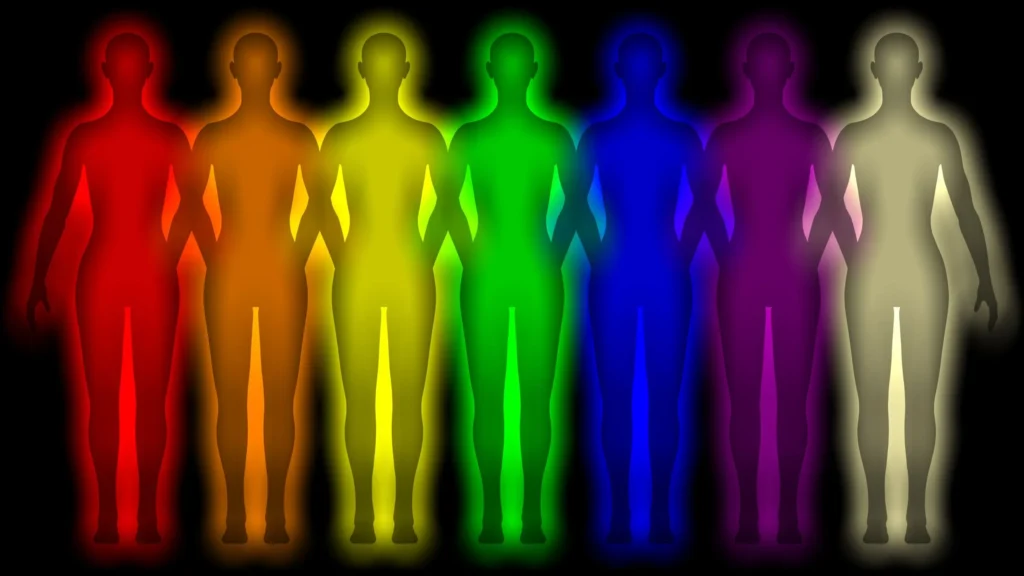
Cultural Interpretations of Color in Spirituality
Across cultures, the spiritual significance of colors varies yet often shares common themes. In Eastern philosophies, such as Hinduism and Buddhism, chakra colors form the foundation of energy systems. Red symbolizes stability, yellow represents power, and violet aligns with cosmic consciousness.
In contrast, Western symbolism often portrays white as purity, black as mourning, and blue as divine truth.
Colors are central to rituals, ceremonies, and sacred art—from Tibetan mandalas to Christian stained glass. These visual expressions hold layered meanings, contributing to a culture’s spiritual vocabulary.
Recognizing these differences deepens our appreciation for color symbolism and its diverse spiritual color meanings across humanity.
How to Use Color for Spiritual Healing
Integrating the spiritual significance of colors into daily life is a powerful path to healing and balance. One proven method is color therapy or chromotherapy, which uses light frequencies to stimulate healing responses.
In meditation, we can visualize chakra colors to align energy centers—for example, imagining a golden light for the Solar Plexus or deep blue for the Throat Chakra.
We also suggest using spiritual colors in practical ways: wearing specific hues, decorating with purpose-driven color palettes, or placing corresponding crystals (like amethyst for intuition or rose quartz for love) around your space.
These practices not only enhance your energy but reconnect you with your deeper self, proving how impactful the spiritual significance of colors can truly be.
Conclusion: Listening to the Colors Within
Each hue we encounter carries a message. By understanding the spiritual significance of colors, we gain a powerful tool for self-awareness, healing, and transformation.
From the grounding red of the earth to the ethereal violet of spirit, every color we’re drawn to is a signal from our soul.
Let’s tune in, feel the colors, and let them guide our journey.
FAQs
1. How do I know which spiritual color I need right now?
Tune into your emotions. The color you’re most drawn to often reveals what your energy is seeking.
2. Can aura colors change over time?
Yes, aura colors shift based on emotional, mental, and spiritual states.
3. Are chakra colors the same for everyone?
Generally, yes. But individual experiences and cultural contexts may influence interpretations.
4. How do I use color in spiritual healing?
Incorporate colors through meditation, clothing, crystals, or visualization techniques.
5. Is black always a negative color spiritually?
Not at all. Black holds sacred energy and is vital for protection, depth, and shadow integration.


